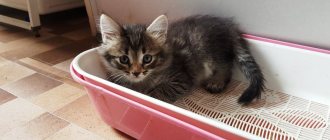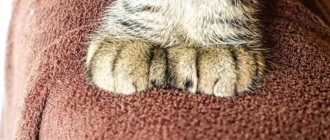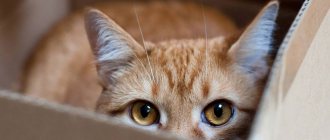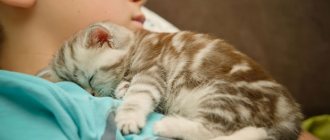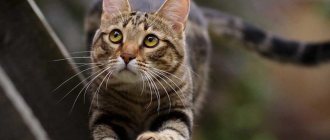The fact of losing a pet is connected with everything. Some owners blame themselves, others blame fate or karma, others nod to natural selection and are not particularly worried. If we put aside emotions and attempts to justify ourselves, then the wording that cats do not take root in the house does not even come to mind, there is always a reason for everything.
Naturally, “non-adoption” cannot be associated with the death of an animal from old age. There is nothing you can do about it, every living being has its own time. When a pet goes over the rainbow in old age, the owner needs to accept it and not blame himself , give himself time to adapt and move on. Not many people decide to have another pet, since the death of a cat from old age is equivalent to the loss of a family member.
There is another side of the coin, a person gets a cat, it doesn’t live even a year... and the person gets a new cat. This continues for some time and the owner either comes to terms with the fact that the animals are “short-lived”, or builds chains (not always logical) and looks for the cause of the tragedies.
Why don't cats live in the house for a long time?
Very often, owners blame themselves for the loss of an animal: they didn’t keep track, they offended, the cat took the negativity upon itself. There are also those who don’t really think about the cause of what happened. In addition, sadly, every living creature has its own life span. Therefore, it is worth carefully analyzing the situation in order to avoid troubles in the future.
Rational explanation
In fact, like any phenomenon on planet Earth, there is a rational explanation. Therefore, if you are an ardent skeptic and do not accept the esoteric and mystical sides, rejoice, below is a list of logical and understandable explanations.
The cat got lost
Unfortunately, not every cat is well oriented in space. Some of them (especially quiet, domestic ones) can get lost just a couple of blocks from home. This can happen if an animal chases a butterfly or runs away from a dog.
Another completely acceptable explanation is that the animal went on a spree. And what happens next - loss, death, theft of a pet - one can only guess.
Mistreatment
Many cats are extremely sensitive, no matter how strange it may seem. And if some of them will endure the shouts and curses of their owners all their lives, then others will leave after the first raised voices.
If the room is dark and humid enough, it will be an excellent place for the development of a large number of microorganisms. Many of them are carriers of various diseases. Cats will not live in such a house for safety reasons.
Energy at home
Esotericists say that a cat feels something that not every person can feel. If there is negative energy in the apartment, the pet will try to spend more time outside the house or even run away. Another scenario will be that the cat will take all the negative energy upon itself. This can seriously affect him and even be fatal.
Before purchasing a home, make sure it is not located in a former cemetery. You should also check to see if any terrible events have occurred in the apartment. If you find that something terrible happened in your apartment earlier, carry out an energy cleansing of the room. Priests or esotericists will help you with this.
Interesting signs
There are probably more signs associated with cats than others; we have collected the most interesting, unusual and unexpected of them:
- It turns out that you shouldn’t go to bed with a cat - it can be bothered by bad thoughts and nightmares;
- It is better for pregnant women not to pet cats;
- a cat in a dream is a bad sign and promises betrayal of friends;
- if a cat suddenly shits on the bed, a quick move is ahead;
- if a cat stretches its paws towards a person, it means that the person will soon buy himself a new thing;
- A constantly meowing cat means an addition to the family. Of course, if meowing is not a complaint of illness.
There are also many negative signs, but we will not dwell on them, since we need to concentrate only on the good.
Cats and perfume
Frequent disappearances of cats are associated with the dissatisfaction of the brownie , and those who have a house in the private sector, with the activities of the barnkeeper (the brother of the brownie priest) . But here the accusations are clearly in vain .
They are both protectors of the home, family, and economy. Therefore, they are not interested in harming their household. Most likely, another creature, like a “poltergeist,” has settled in the house, which provokes unpleasant events.
Good or bad?
A cat in the house is definitely good.
It is no coincidence that when crossing the threshold, it is she who is the first to be launched. By the way, why do they do this? It is believed that a cat not only protects the owners and the apartment from bad energy, but also cleanses them of existing negativity. She distinguishes between the intersections of magnetic fields, so the place where she lies down is considered the cleanest in terms of energy, and that is where the bed should be placed.
If during its stay the animal feels the presence of evil spirits, it will certainly make this clear by its behavior. At first, the animal will deal with the entity: who or what it is, why and why it appeared in the apartment, whether it poses a threat. If the energy field of the entity turns out to be negative, the cat simply draws it into itself, using its own field, and takes it out of the apartment.
It is quite easy to determine the presence of negative energy by the behavior of a pet: usually the cat freezes in the same place, often in a strange position, and looks in one direction. In this way she tries to understand the nature of the entity. To cleanse the aura of the apartment, you need to stand in this place and read a prayer.
Another indisputable advantage of living with a cat is its warm relationship with the brownie. The latter, as you know, are very fond of tailed animals, since they are intermediaries between two worlds.
Various fungi and infections
The reason that the cat does not take root may also be the presence of invisible infections or diseases in the house. A very dangerous infection is plague. The causative agents of this disease can be found everywhere: on the floor, on furniture, on tables. A person cannot see them, but a cat feels and feels in danger.
Other infectious diseases can also cause harm. To avoid the appearance of fungus in the house, which can lead to the death of a cat, disinfect the room. If your previous pet died from fungi or infections, you definitely need to start cleaning the house.
Having tested these theories, your cat will definitely take root in the house. It is worth remembering that the animal may feel uncomfortable due to hunger or stress. Remember to properly care for your cat and monitor its mental and physical health.
Love for a pet
Animals become attached to their owners and respond with love to care . A person, due to his inertia or irresponsibility, is inclined to believe that there is no need to walk with a cat. But this is not true at all. In city conditions, cats are walked on a harness with a leash . This fact has its justification.
Cats without owner supervision face many troubles:
- Keep in mind that they may fall under the wheels of passing vehicles.
- She can be offended by bad kids who like to make fun of animals.
- A cat can get into a dog's teeth.
- He may get lost and lose his bearings and not return back.
- Cats, both domestic and feral, control their territory. Your pet may become a victim of a battle for her.
- Many cats from the private sector become victims of poisoning. Having caught a mouse poisoned with a special bait, he himself consumes the poison and dies.
- How many neighbors hate any animals and try to harm them? Or chasing cats who got into the habit of their kitties. No one wants to ruin the potential kittens that their pet might bring.
- Out of curiosity, a cat can go into someone else's metal garage and die there from hunger, being closed. After all, the owner has no idea that he has guests.
- An animal can climb a tall tree and fall from a height, breaking its legs or spine.
- It may be threatened by rodent traps.
Self-walking is a death sentence
Now let's return to the proven, substantiated, written in blood facts. Most young animals die while walking on their own. That is, the cat goes out into the street unattended, gets hit by a car, in the hands of knackers, in the teeth of a dog, or simply gets lost and dies. Realists are aware that their animals are dying, “optimists” believe that the cat simply left, did not take root... and adhere to this thought for the rest of their lives.
The most colossal rates of injuries (often incompatible with life) are recorded in animals living in a private home:
- While walking along quiet streets, pets “unexpectedly” fall under the wheels of cars.
- Once in someone else's yard, the cat becomes a victim of the dog, which guards its territory.
- Cats participating in fights for territory or the right to mate lose their eyes and suffer serious head injuries.
- Often, very often, four-legged animals die at the hands of well-meaning neighbors who simply do not like cats.
- A huge number of fluffies fall into traps for rats and ferrets.
- Death from rat poison is also on the list, since cats can easily catch already poisoned rodents.
- Cats die of starvation when they are not intentionally locked in someone else's garage or barn.
- Pets fall from trees and if they do not fall on high-voltage lines, they break their paws or are seriously injured.
- Hundreds of animals die at the hands of knackers and teenagers who, out of interest, kill those who are weaker.
If an animal dies before reaching home, the owners think that the cat has not taken root; the death of an animal while walking is the full responsibility of the owner! But that’s not all, let’s dig a little deeper.
All unsterilized animals that walk on their own mate and bear offspring. Even if a cat lives in your house and he does not “bring in the lap”, this does not mean that he will not become the father of dozens of kittens, will not participate in fights, will not fall into the hands of the owner of the “future mother” or into the teeth of the dog guarding the yard , where the “wedding” takes place.
So, if you do not want to count yourself among the group of people who do not have cats, take care of the safety of your pet. Don’t let your cat wander unattended, and if your four-legged cat manages to run away in search of adventure, do the following:
- If you have a cat, neuter him. As practice shows, a castrated cat no longer has the desire to leave his personal territory. Males travel with the goal of finding a cat and mating.
- If you have a cat, spay or neuter her. Firstly, you won’t have to think about where to put the kittens, and secondly, the pet will not attend weddings and will not want to go far from home. If you are concerned that a neutered cat will not hunt, consult your veterinarian. This statement is nothing more than an ignorant myth!
- Be sure to purchase a bright collar and an address tag for your pet. And never remove them from your cat.
- Have your pet microchipped; if he is injured and taken to the veterinarian, they will be able to find you using the information assigned to the chip number.
- If you don't want to risk your cat, hang a bell on its collar. The pet will not be able to catch a bird or rodent, which means it will not be poisoned by rat poison and will not pick up parasites.
Note! No amount of precautions, or even a GPS sensor on a collar, will give a complete guarantee of safety while walking on your own. The above recommendations will increase the chances of survival, but will not save the pet.
If your pet is truly dear to you, do not let him go for walks on his own. Myths that a cat is a wild creature and only knackers can keep it locked up are justifications for irresponsible owners who have already lost their pet. All modern cats are domesticated, that is, they must live in a house!
Important! Some owners believe that depriving a cat of walks is inhumane. If you also feel an obligation to your pet, get him used to a harness and leash, take time and take safe walks.
An interesting interview was published on one of the social networks, more precisely, a dialogue between a veterinarian and an excited cat owner. It must be said that this dialogue took place after a 4-hour operation and a fight for the life of the quadruped. The woman justified self-walking by saying that the cat really loves to walk on her own, and the veterinarian asked: “She told you that, she just came and said, I want to walk on my own?” This is the whole point, if you get an animal, be prepared for responsibility, if you are not ready, buy a plush cat.
Historical reference
It is widely believed that cats were domesticated by the Egyptians. It was refuted by an interesting discovery by scientists at the beginning of the 21st century: a burial dating back to 9500 BC was discovered in the Middle East. e., in which a cat was buried along with a man. Despite this discovery, the idea of a deep and long-standing connection between cats and the Egyptians still lingers in the mind. The ancestor of the pet is considered to be the steppe cat, which to this day lives in some areas of Africa, Asia, India and the Caucasus.
Over time, the genome of the steppe cat changed, resulting in the appearance of domestic cats. The first attempts to domesticate the steppe cat occurred around 10,000-9,000 BC. e. An interesting version is that the wild animal itself showed interest in humans.
Noticing that rodents often appeared near food, the cats came to the conclusion that it was better to be friends with people. Starting from 4000-3200 BC. e. cats began to spread everywhere, but given the fact that they are not big fans of traveling and changing their place of residence, we can conclude that there was human intervention in their settlement.
Some historical information
In Orthodoxy, it is forbidden to kick a cat out of the Temple, unlike dogs; if a dog visits the altar, it must subsequently be reconsecrated (it is believed that the animal has desecrated it), and a cat can easily get away with something like this.
Over the course of centuries, different nationalities have created and passed on signs about cats, many of which have survived to this day. Today it is difficult to find a home that does not have a cat: some people get a pet to get rid of rodents, and others get some variety in their lives. In modern society, the tendency to have purebred cats has become quite popular.
Superstitions, omens and evil eyes
All sorts of signs are associated with missing cats, which can be very easily refuted. We are used to dividing them into bad and good. And very often we involuntarily subject ourselves to self-hypnosis. As soon as a sign is associated with some negative situation, we begin to think about it more often and, as a result, attract it into our lives.
Very often, lonely, elderly people who get a pet to brighten up their lives suffer from the loss of a cat. They feel the loss of an animal so acutely that they worry for a long time.
In some situations, owners treat their animals like children who don't exist. And when pets disappear, they convince themselves that they “are not given the opportunity to have children.” But everything can be quite the opposite. Feeling that the young housewife will soon become a mother, the cat makes room for a new person.
There are people who believe that the cat disappeared due to the evil eye. Allegedly, they have ill-wishers who know how dear he is to his owners, that they will worry about him and deliberately provoke his disappearance.
Why don't they take root?
In some apartments and houses, cats just don’t take root: they run away, get sick, and die.
This applies to expensive purebred cats, those raised in a shelter, and tiny kittens from the street or from a nursery. A person tries very hard, spends money on vitamins, high-quality food, toys, becomes attached to the animal and protects it in every possible way, but not even a year passes before the cat voluntarily leaves the house or dies. Why does this happen? The death of cats due to illness can be explained by the presence of a virus in the house.
There are pathogens that can quietly exist within the walls of an apartment, waiting for a new victim, and as soon as the owner decides to get a pet, the virus attacks and infects the new resident of the apartment. A pet can run away from an apartment for various reasons, including quite obvious ones.
For example, if the owner does not feed the animal, treats it cruelly, beats it, or allows the child to do whatever he wants with it, the desire to escape is absolutely appropriate. Also, an unneutered cat and an unsterilized cat can run away in search of pleasure, at the call of hormones. But there is another side to the coin, when pets do not stay in the house for reasons that are not entirely objective.
Brownie
There is a belief according to which a cat may not take root in a house due to the whim of a brownie. Cats and brownies really get along well with each other, but if the owner treats the brownie badly, the latter may harbor a grudge and take revenge in this way.
The brownie may try in every possible way to drive away his beloved pet and even kill him. In this case, it is recommended to establish relations with the brownie, because he protects and guards the house, but is in no way a killer or a dangerous entity.
To establish friendship with a brownie, you need to prepare a treat (candy, sugar cube) and leave it for him, as well as regularly talk and ask him not to offend the cat. It is difficult to say how realistic this hypothesis is, because it is unlikely that a good brownie would get rid of a cat with whom they, as a rule, have no disagreements, in such a monstrous way.
Popular beliefs
Many people are skeptical about folk signs and beliefs. This is understandable, because the signs are not written down anywhere, do not have an author, and it is not clear: either they appeared as a result of long observations, or became the tale of some merry fellow.
Evil eye, damage, curse - possible reasons for a pet leaving home
In addition, psychologists say that omens only work where people believe in them, and in this way you can only attract negativity to yourself and your home.
Usually lonely people or those who consider themselves unhappy, for example, due to long unsuccessful attempts to find a job, have children, or sell an apartment, firmly believe in omens. But it turns out that this faith attracts all failures, and it turns out to be a vicious circle.
The most common beliefs are associated with the following signs:
- In a childless family, they believe that cats don’t stick around because the spouses are destined to be single. Since they treat the animal like a child, some forces take it away;
- The owners of the apartment were jinxed. One of the ill-wishers caused damage, wished misfortune, or simply mentally directs troubles at the person, thereby causing the death of the pet. Since the owner is attached to the animal and will suffer greatly, this is called the death of the cat from the evil eye;
- the third reason is the so-called generational punishment, i.e. curse. Someone could direct a strong evil eye or curse to destroy the entire human race, including animals.
Coldness of the owners
A cat is an independent creature, but just like people, it needs love and good treatment. If one of the family members treats the animal unworthy, the pet may simply run away or be constantly nervous. Sometimes the owner treats the cat well, but with noticeable coldness.
To avoid such a problem, talk with your loved ones and rethink your attitude towards the animal. If it seems to you that this is the whole point, contact with your pet will improve. Remember that the cat needs your care.
Other superstitions
There are many different signs of superstition, according to which an animal can leave the house. Some people view them with distrust, while others confirm their realism. Here is just a small list of such beliefs:
- The animal felt that a serious illness or death of one of the family members was coming.
- A new addition to the family (or early news of pregnancy) is expected. Thus, the cat supposedly makes room for a new resident.
- There is an atmosphere of black magic in the house. And here we are not talking about the fact that one of the owners is engaged in witchcraft. Quite the contrary, this means that the family was exposed to external influences (damage, the evil eye, etc.).
- A strong curse that is directed at the owner. In this case, if the cat disappears, it is argued that he has taken upon himself all the “blackness” that was intended for his owner.
- Another popular option is not having children. That is, if it happens in a family that they cannot have children, most of them get a pet (in particular a cat). And because they treat the animal as their child, “God takes the child, because it is not given to have.” The version is similar to absurdity, but nevertheless.
According to signs, you can predict the departure of an animal. The cat begins to behave anxiously, refuses to eat, loses weight, sleeps very little (constant external stimulation). In such cases, it is recommended to cleanse the house. After all, all these signs indicate that the pet is worried about something... or maybe someone?
Need for freedom
Not all cats crave to live in a calm and peaceful atmosphere next to loving and sometimes overly intrusive owners.
Among these proud animals there are many who prefer freedom to comfort. An energetic and inquisitive cat, confined within four walls, will feel sad from idleness. Especially if the owners are away most of the time, and after coming home they do not want to play with him.
If an adult cat was picked up on the street, where he felt quite comfortable, then life in a city apartment without access to fresh air will definitely not be to his liking.
Rational reasons
There are several reasonable and understandable explanations why cats do not get along in the house.
The animal got lost
Not every cat recognizes the area well. There is always a risk that she might get lost several blocks from home. For example, if he runs away from a dog or runs after a dragonfly.
Another option is for a cat to run away in search of its relative during the mating period. An animal may go on a spree and not come back. It is recommended to sterilize your pet. Then there will be no desire to leave your personal territory.
The cat was stolen
The big disadvantage of walking your pet on its own is that it can be taken by strangers. No one is immune from this. Theft can happen on the street near a private house, in the entrance, or near a multi-story building.
Walking down the street unattended often ends in the death of the animal. Danger awaits at every step: the risk of getting hit by a car, in the hands of flayers, in the teeth of an aggressive dog. A cat may accidentally eat poison that is put out for mice, rats, and other pests. Walk your four-legged friend under supervision and his life will be safe. To do this, you can purchase a collar and leash.
Bad attitude
If cats often run away, think about it. This happens because the animals are unhappy with something. Perhaps annoying behavior from children, hunger, abuse, constant screaming, increased tone of voice. A cat is an independent animal and can go where it will be treated better.
Virus
It happens that cats die in the same house one after another. The cause is a virus. After all, some of them can be stored in a residential area for a year. Viruses settle everywhere: on furniture, walls, things, carpets. Therefore, the new pet becomes another victim. If a cat suddenly dies, treat the house with a quartz lamp and a disinfectant solution. It is better to get a new pet after a year. There is a greater chance that he will not contract the virus. If the animal has had lichen or another fungal disease, the house should also be disinfected.
Remember that it does not matter what reasons the animal leaves home are based on: mystical or rational. One thing connects them - a cat will never continue to live in a house where it is uncomfortable and ill.
Relapses of infection
If a kitten died in the house from an infectious disease, then bringing another baby the next day is tantamount to murder, since pathogenic microorganisms have spread throughout the room and are waiting for a new victim.
Viral infections pose the greatest threat, since viruses are resistant to antibiotics and undergo constant mutation. Thus, the body has to cope with the enemy on its own, activating the immune system and producing protective antibodies. Veterinarians name 3 deadly viruses for cats:
- feline viral peritonitis;
- feline viral leukemia;
- viral immunodeficiency of cats.
It is noteworthy that even with timely treatment and the use of all available means, the prognosis of the disease is very unfavorable.
What to do. Undoubtedly, the pain of loss will be excruciating, but in order to avoid a sad relapse, you should put aside your emotions and approach the situation rationally. To minimize the risk of infection it is recommended:
- Bid my time. Viruses are not persistent in the external environment, so after a certain period they are deactivated outside the body of the host animal.
- Without regret, throw away the belongings of the deceased pet, including a bed, toys, collars, scratching posts and bowls. In addition to being a potential reservoir of infection, they will be a reminder of a departed four-legged friend. If you decide to leave the “inheritance,” then bowls and rubber balls should be boiled, and soft toys, houses and scratching posts should be disinfected using special solutions or a bactericidal lamp.
- Thoroughly wash floors and smooth surfaces with solutions containing strong chemicals (alkali solutions, bleach, Lysol) or modern veterinary disinfectants (Virkon S, Ecocide S, Virocid, Bianol, Bromosept-50).
- Use artificial sources of ultraviolet irradiation - gas-light mercury lamps (in common parlance - “bactericidal or quartz lamps”) to disinfect air, walls, carpets and furniture. Radiant energy quickly and destructively affects pathogens.
How do folk signs suggest returning something lost?
Sometimes cats just get lost
We will not talk about practical ways to return a missing animal now. A lot has been written about this on the Internet. But when all real methods have been tried and all you can do is wait, you really want to resort to the help of higher powers! Why not try it?
- Place your missing pet's favorite treat in his bowl, light a white candle and place it on the floor next to the bowl. And then mentally ask the bright forces of the Universe to save the animal and return it to you safe and sound. Let the candle burn out completely.
- Pour water into a glass and place it at the front door, saying: “To my house, to my threshold.” At this time, try to imagine in detail how the missing animal enters your apartment.
- Tie a rope around the perimeter of all four legs of the table at which you are dining. And wait for good news.
- Standing with a burning candle near the open window, say loudly: “Smoke up the mountain, (name) to the house!”
- If you are a believer, it is better not to resort to rituals, even the most innocent ones - you will only bring confusion into your soul. Go to church, light a candle and ask your pet to come home. In your own words, but with all your heart.
While there is a chance to return the escaped cat home, do not give up. It happened that the animal found its owner a month, or two, or a year later! But if days go by and your furry pet doesn't return, try to mentally let him go. Either a tragic accident happened to the animal, or it actually protected you from something worse. Enjoy the good moments you have experienced together and look to the future. In any case, it is better than useless experiences.
Signs about the suit of a cat
Beliefs about cats also differ based on the color of the animal.
Thus, tricolor cats have always been the personification of good luck and prosperity; if an animal of this color is nailed to a home, this indicates a new relationship, very successful and long-lasting. Residents of Japan, in honor of the tricolor cat, began to produce porcelain figurines, which are called “money cats” or “lucky cats.”
A tricolor cat also protects the house from fire and disaster. According to legend, the owner of such a cat will never suffer from fever.
Folk beliefs about calico cats are always positive. This animal combines three opposite colors, each of them in turn personifies something: white - speaks of purity and peace, black - helps get rid of troubles, red - portends material well-being.
The sign about a black cat suggests that if an animal of this color crosses your path, you should prepare for failure. Then it is better to cancel the trip and return home. Since ancient times, the black cat has been accused of being associated with evil spirits. But not all beliefs about black cats have a negative meaning.
White cats promise harmony in the home. If a kitten of this color comes to you, be sure to take it, it will bring you happiness, health and peace. Also, according to doctors, white cats do not produce allergens.
If, when leaving home, you meet a white cat, this is a good omen, your plans will definitely come true, and success awaits you.
Red cats indicate material well-being and stability.
Gray cats in the house have the same qualities as black ones; they protect their owners from negative energy, troubles and failures.
Be that as it may, if the owner loves his pet and treats him with care, the furry animal will certainly thank the owner with its warmth, protect him from illness and simply delight him with his presence.
Cats are the most familiar and most mysterious animals, they can be affectionate and playful, they cannot live without humans and therefore it seems strange why cats do not take root in the house.
In the middle of the last century, in a small provincial town there lived a cat, Musya, who is still remembered and has an interesting story to tell. Musya unexpectedly appeared in one or another yard, lived for some time, carefully examined the house and even caught mice. Then she disappeared and a few months later appeared with a kitten in her teeth, carefully laid her child at the feet of the mistress and left forever. Wise Musya herself gave her kittens into good hands, and she was never mistaken. The kittens were adopted and lived happily ever after.
All kittens are adorable, they enjoy the admiration of their owners and their self-esteem increases in direct proportion to this admiration. The cat quickly determines who in the family has the greatest authority and considers this person equal to his person, and all other members of the household become members of his pack. And if one day the cat understands who he really is, he will never stay here. That's why cats don't live in the house, they don't forgive bitter insults.
Freedom-loving, independent cats still form strong bonds with their owners. They know how to relieve attacks of tachycardia, lower blood pressure and treat life-threatening diseases. But only those they love receive their “medical care.” As soon as you picked up the black and white cat Mitya, your heart began to beat more regularly.
You can often hear that cats of such and such color do not live in this house for a long time. There is nothing mystical here; the color of a cat affects its character in the same way as hair color affects people. Everyone knows that brunettes are stricter, blondes are kinder, and redheads are the funniest. The subtleties of the color of cats still remain a deep secret, although it is certainly known that the best mousetraps are gray tabby cats.
Only females are tricolored, and pure red color is the property of males. There is a belief that tricolor cats bring happiness, although it is not known for certain who, when and what kind of happiness came from the kitty. Cats, of course, can live where they don’t really like, because they feed them, but this is for the time being.
READ Why do cats like to sleep in public?
But to the question why cats don’t live in the house, there is another answer. A cat can steal a piece of meat from the table, it can challenge its primacy, it can take revenge (bite, scratch, break something and even shit), but this is all, as they say, a working moment. As for vital issues, the cat will not betray, will not let you down, she will courageously take upon herself, to the extent possible, retribution for the sins of her beloved owners and will pay for it with the most expensive price in the world - her life. It is possible that all these unaccustomed Murkas and Vaskas came to the yard much more than other cats.
There is a popular belief that if cats do not take root in a house for a long time - they die prematurely, then they take upon themselves the troubles that can happen to their owners.
Agree - a house in which cats do not take root, die or leave for no apparent reason is very rare. As a rule, these animals adapt well to any environment and feel good even in places where people find it uncomfortable and unpleasant to live.
Brownie
The most common version is that the brownie is playing pranks. From time immemorial there has been a belief that cats and brownies never get along. Simply put, a certain spirit is against the presence of these animals in the house and, therefore, tries in every possible way to drive them away or, even worse, to harm them.
There are countless tips for this problem on every mystical forum. And if you are not an ardent skeptic, then why not try them?
Popular wisdom advises simply making friends with the brownie. This can be done with the help of a kind of “bribe”, exemplary behavior and a request to save the life of the pet. You can find instructions on how to present a “tribute” to a brownie on the same forums.
However, it is worth noting that the problem may not only be with the brownie. Perhaps there are more serious “ill-wishers” in your home that you do not see. Spirits and clots of negative energy can also trigger the loss of a pet. But first things first.



